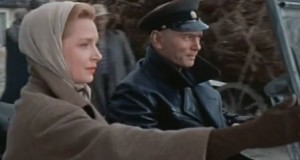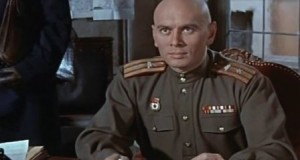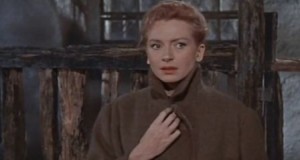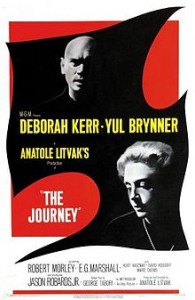As much as I applaud WAC’s efforts to mine their archive for the best in overlooked and unreleased classics as part of their MOD program, their releases are enormously spotty. Granted, they are only the messengers as these films are merely archival- and it is good to have them available in any case.
Such is the case with 1959’s The Journey, starring [intlink id=”501″ type=”category”]Yul Brynner[/intlink] and [intlink id=”492″ type=”category”]Deborah Kerr[/intlink]. It also counts among its feats the first on screen appearances of both Jason Robards and Ron Howard (that’s right, straight from Mayberry). Acting, along with direction from famed director Anatole Litvak are all spot on. So what doesn’t work?
For starters, and in the interest of full disclosure, the Hungarian Revolution of 1956 isn’t high on my interest list. From 55 years of looking in the rear view mirror, it looks dated and rather tired. I’m not sure that even in 1959 would I have had an interest, but that’s just me.
Perhaps more objective is that it is a very difficult movie to describe. Parts of it- the Eastern Europe setting, the overall feeling of claustrophobia, and the dynamic on-screen pairing of Deborah Kerr and Yul Brynner are the strong points of the film.
 This was only the second (and ultimately final) on-screen pairing of Kerr and Brynner, with the first being The King and I a few years earlier. They work as well if not better here, though of course the context is completely different.
This was only the second (and ultimately final) on-screen pairing of Kerr and Brynner, with the first being The King and I a few years earlier. They work as well if not better here, though of course the context is completely different.
The challenge with the film comes in what could be termed a rather unbelievable plot. Brynner, a Major in charge of the border crossing Kerr, her lover (Robards)- a Hungarian national and former scientist who has been tortured by the authorities due to his relations with Kerr. Along with Kerr is another American family also seeking to cross the border into Austria, as the airport is closed due to the insurrection.
 For whatever reason, Brynner holds them at the border, refusing them passage into the safety of Austria. Presumably this is because Brynner is lonely in his posting and would like some conversation, but he is also quietly attracted to Kerr, who feels herself returning the feeling.
For whatever reason, Brynner holds them at the border, refusing them passage into the safety of Austria. Presumably this is because Brynner is lonely in his posting and would like some conversation, but he is also quietly attracted to Kerr, who feels herself returning the feeling.
Brynner’s character is obviously a complicated one, as he realized the dichotomy in the Soviet mantra of liberating the people, evidently in repressing them. But why a border officer would do anything so pervasive as detaining as hostages folks without cause and jeopardize his career and live seems to require an explanation a bit deeper than mere solitude. Oh well.
The interplay between the two is quite riveting as they become closer and also expose the lies in each other lives and the hypocrisy both live with – and more than a little guilt in Kerr’s as well.
As things go on and time begins to run short, the group pushes for Kerr to make a certain “offering” to Brynner in exchange for letting the group pass. The tension builds up to a fateful conclusion.
Jason Robards, though performing very well here in a debut role, seems as a bit of an afterthought, as perhaps he was given where the stars were in their careers at the time.
 The Journey isn’t a great film, though the on screen pairing of Kerr and Brynner is one of the best (if not most seen) in history. They are the reason to examine this one, as the film can never really decide whether to be a cold war thriller or a romance. It tries to straddle the fence and does so exceptionally well- so much so that the film seems aimless at times.
The Journey isn’t a great film, though the on screen pairing of Kerr and Brynner is one of the best (if not most seen) in history. They are the reason to examine this one, as the film can never really decide whether to be a cold war thriller or a romance. It tries to straddle the fence and does so exceptionally well- so much so that the film seems aimless at times.
WAC is about to release this through their MOD program (and thanks to them for the review copy). The Journey is a bit of a confused film but the direction and acting make it an attractive idea.
